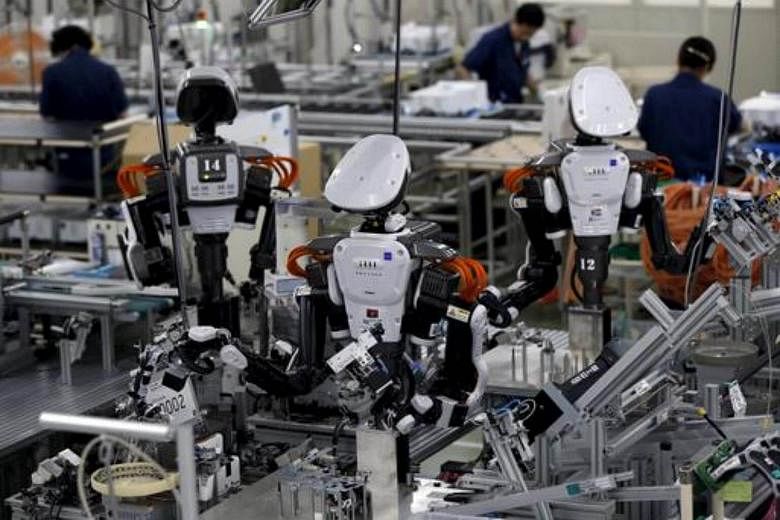NEW YORK • Like a lot of children, my sons - Toby, seven, and Anton, four - are obsessed with robots.
In the children's books they devour at bedtime, happy, helpful robots pop up more often than even dragons or dinosaurs.
The other day, I asked Toby why children like robots so much.
"Because they work for you," he said.
What I didn't have the heart to tell him is, someday he might work for them - or, I fear, might not work at all because of them.
It is not just Elon Musk, Bill Gates and Stephen Hawking who are freaking out about the rise of invincible machines.
Yes, robots have the potential to outsmart us and destroy the human race. But first, artificial intelligence (AI) could make countless professions obsolete by the time my sons reach their 20s.
You do not exactly need to be Marty McFly to see the obvious threats to our children's future careers.
Say you dream of sending your daughter off to the Yale School of Medicine to become a radiologist. And why not? Radiologists in New York typically earn about US$470,000 (S$633,000), according to Salary.com.
But that job is suddenly looking iffy as AI gets better at reading scans. A start-up called Arterys, to cite just one example, already has a program that can perform an MRI analysis of blood flow through a heart in just 15 seconds, compared with the 45 minutes required by humans.
Maybe she wants to be a surgeon, but that job may not be safe either. Robots already assist surgeons in removing damaged organs and cancerous tissue, according to Scientific American. Last year, a prototype robotic surgeon called Star (Smart Tissue Autonomous Robot) outperformed human surgeons in a test in which both had to repair the severed intestine of a live pig.
So perhaps your daughter detours to law school to become a rainmaking corporate lawyer. Skies are cloudy in that profession too. Any legal job that involves lots of mundane document review (and that's a lot of what lawyers do) is vulnerable.
So am I paranoid? Or not paranoid enough? A much-quoted 2013 study by the University of Oxford Department of Engineering Science - surely the most sober of institutions - estimated that 47 per cent of current jobs, including insurance underwriter, sports referee and loan officer, are at risk of falling victim to automation, perhaps within a decade or two.
Just this week, the McKinsey Global Institute released a report that found that a third of American workers may have to switch jobs in the next dozen or so years because of AI.
I know I am not the only parent wondering if I can robot-proof my children's careers. I figured I would start by asking my own what they want to do when they grow up.
Toby, a people-pleaser and born entertainer, is obsessed with cars and movies. He told me he wanted to be either an Uber driver or an actor. (He is too young to understand that those jobs are usually one and the same).
As for Uber drivers, it is no secret they are headed to that great parking garage in the sky; the company recently announced plans to buy 24,000 Volvo sport utility vehicles to roll out as a driverless fleet between 2019 and 2021.
And actors? It may seem unthinkable that some future computer-generated thespian could achieve the nuance of expression and emotional depth of, say, actor Dwayne Johnson. But Hollywood is already Silicon Valley South. Consider how film-makers used computer graphics to reanimate Carrie Fisher's Princess Leia and Peter Cushing's Grand Moff Tarkin as they appeared in the 1970s (never mind that Cushing died in 1994) for last year's Rogue One: A Star Wars Story.
My younger son Anton, a sweetheart, but tough as Kevlar, said he wanted to be a football player. Robot football may sound crazy, but come to think of it, a Monday night battle between the Dallas Cowdroids and Seattle Seabots may be the only solution to the sport's endless concussion problems.
Looking for a silver lining, I spent an afternoon watching TED Talks with catchy titles such as Are Droids Taking Our Jobs? In one, David Autor, an economist, argued that reports of the death of work are greatly exaggerated.
Almost 50 years after the introduction of the ATM, for instance, more humans actually work as bank tellers than ever. The computers simply freed the humans from mind-numbing work such as counting out US$20 bills to focus on more cognitively demanding tasks like "forging relationships with customers, solving problems and introducing them to new products like credit cards, loans and investments", he said.
Computers, after all, are really good at some things and, for the moment, terrible at others.
Even Anton intuits this. The other day, I asked him if he thought robots were smarter or dumber than humans.
"Sdumber," he said after a long pause. Confused, I pushed him. "Smarter and dumber," he explained with a cheeky smile.
NYTIMES
• Alex Williams is co-author, with Nick Srnicek, of Inventing The Future: Postcapitalism And A World Without Work.

